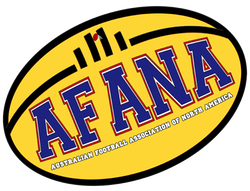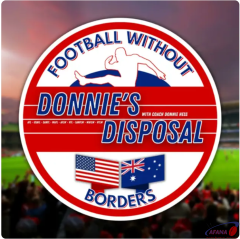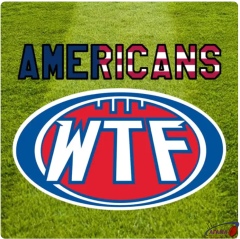10. Footy FAQ: Footy Words You Need to Know
This is a "dictionary" of terms common in Australian football. While there is a some general Aussie slang here, our emphasis is on the lingo or jargon of footy. For general references to Aussie slang see these sources: http://www.australiatravelsearch.com.au/trc/slang.html and http://www.australianslang.org/
A/C: acromio-clavicular joint, the shoulder joint; severe injury to the A/C joint can sometimes require a reconstruction and sideline a player for the season.
ACL: anterior cruciate ligament. One of several ligaments which support the knee and connect the knee joint to the other leg muscles. A ruptured ACL requires a knee reconstruction and will sideline a player for 12 months. However, some players have opted for the LARS procedure (Ligament Advanced Reinforcement System) which uses artificial material to replace the damaged tissue instead of a graft. It has been used for the last 4-5 years and players have returned to play in 4-6 months. It has been used in Europe for over 20 years but only came to prominence in AFL when Sydney's Nick Malceski was the first player to undergo the procedure in 2008.
Advantage paid: umpiring decision in which play continues after an infringement if the team with the ball is infringed upon; rather than stop play to award the free kick, the umpire allows play to continue so as not to disadvantage the attacking team.
After the Siren: a set shot for goal after the final siren.
Ball (shouted): when a player is caught with the ball by an opposing player or the ball is locked up on the ground by a pack of players, fans will shout "Ball" as an encouragement to the umpires.
Ball Magnet: player who accumulates a large number of possessions of the ball is said to be a ball magnet.
Ball on a string: same as ball magnet, a player might be referred to as having the ball on a string or even said to have "brought his own ball to the game".
Ball-up (also bounce or ruck contest): restart of play after the ball has been whistled "dead" by the umpire.
Banana: a kick which bends around the body, also known as a "checkside" punt.
Barrack/Barracker: to cheer for a team, one who supports a team. Origin believed to come from the world wars when army personnel stationed in barracks in Melbourne attended games or their barracks were close to the playing grounds.
Behind: one point scored when the ball passes between a goal post and the shorter outer post, when the ball hits the goal post, or when a defender touches the ball before it crosses the goal line or a defender forces the ball through to prevent a goal being scored.
Behind Line: the line between a goal post and a point post.
Big Dance: the Grand Final
Blinder: excellent performance, e.g. Dan Hanneberry had a blinder of a game with 32 possessions and 4 goals.
Blue: bad mistake, or a fight.
Boil Over: an unexpected upset in which a team not expected to win by any stretch of the imagination pulls off a victory.
Bomb: long kick of the ball.
Brownlow: highest individual honor a player can win. Named for long-time Geelong Football Club servant Charles Brownlow (1862-1924). Equivalent to MVP in the NFL.
Candy or sell some candy: balk or fake out an opponent, also known as selling the dummy.
Category B: a rookie player recruited from outside the usual AFL channels. Irish and American recruits or players coming from other sports without having played footy for a specified number of years are listed as Category B rookies.
Center bounce: bounce of the ball in the center of the ground to start the game, each quarter, and after a goal is kicked.
Center square: a fifty-meter (55 yards) square drawn around the center of the field. Only two players from each team are permitted to stand on each corner of the square during center bounces which start the game, each quarter and after a goal is kicked.
Charlie: nickname for the Charles Brownlow Medal. See Brownlow.
Checkside kick: same as a banana kick.
Chicken wing tackle: an illegal tackle when the tackled player's arms are pinned and he is then usually thrown to the ground, unable to break his fall. Illegal because the tackled player could be seriously injured.
Clanger: extremely bad mistake during play, such as kicking the ball to an opposition player.
Claret: blood.
Clearance: when the ball is cleared from a stoppage in play, such as a ball-up by the umpire, a boundary throw-in or one player clearing the ball from a pack of players who have run in to try and gain possession. An effective clearance occurs when the player first to the ball clears it to a teammate.
Clunk a mark: take a mark (catch the ball), newer slang expression first appearing in 2014.
Coathanger: an illegal around the neck tackle. Also refers to the Sydney harbor bridge.
Complete Package: refers to a player who can do just about everything: goals, run well, catch the ball, tackle, etc. from just about anywhere on the ground. Often will be used to describe a highly rated new recruit.
Contested mark/possession: when two or more players are vying to win possession of or catch (mark) the ball.
Corky or Cork Injury: bad soft tissue bruising in which small blood vessels break under the skin and bleed into the muscle tissue. Most common on thighs and calves.
Cotton Wool: a player coming back from injury or an older player whom the club is trying to protect may be said to be "wrapped in cotton wool" (e.g. given lighter training loads and/or limited game time).
Crook: not well, ill, or can refer to an injury, e.g. a crook knee, a player might also say he or the injury is not too flash.
Daisy-cutter: low to the ground kick of the football. Also called a wormburner.
Dirty: to be angry about something or with someone, e.g. the coach was dirty on the umpires for perceived bad decisions during the game. Filthy can also be used in the same vein. Can also mean to have a poor game (e.g. Travis Cloke had a dirty day with just one goal and 2 marks).
Disposal: when a player in possession of the ball rids himself of the ball by hand or foot. An effective disposal finds a teammate. An ineffective disposal misses its intended target or ends up with an opposition player.
Don't argue: when a player in possession of the ball uses his forearm an open hand to the chest of an opposition player to avoid being tackled.
Drag or dragged: the removal of a player from the field, usually by the senior coach, for poor form or a bad mistake, such as giving away a stupid 50 meter (55 yards) penalty.
Draw: sometimes refers to the schedule of games, or has alternate meaning referring to a tied game; also see fixture or fixtures for draw.
Fifty-meter penalty: penalty awarded to the opposition for an egregious infraction during play, which allows the ball to be moved closer to goal. This penalty can be awarded to the infringed team for improperly returning the ball after a free kick has been called, an opposition player encroaching on the player who has been awarded a mark (catch of the ball), and umpire abuse.
Finals: the playoffs, with eight teams gradually being eliminated over three weeks and culminating in the best two facing off in the Grand Final (equivalent to the NFL Super Bowl) for the Premiership or championship.
Find the Sticks: a player skilled at kicking goals is said to know how to find the sticks. Usually refers to a player other than the forwards.
Fixture: schedule of games for the season.
Fixtures: games or multiple parts or years of a schedule.
Flag: the premiership or Grand Final win. Refers to a time before premiership cups when clubs were awarded a "premiership" flag instead.
Flood: when a team positions most or all of their players in the opposition's forward area to prevent a goal, a player getting the ball to a teammate in a better scoring position, or to gain possession themselves.
Four points: awarded to the winning team for each game during the regular season. Two points are awarded to both teams for games ending in a tie, four points is also common parlance for a team winning the game, e.g., Richmond got the four points over Brisbane.
Free kick: kick awarded to a player after a mark or for minor infractions.
G or The G: the Melbourne Cricket Ground or MCG.
Goal: six points awarded when the ball is kicked through the tall uprights.
Granny: the Grand Final; the championship game.
Grubber or grubby: a kick that runs along the ground (see daisy-cutter or wormburner) instead of through the air, can also refer to an ugly or awkward kick.
Guernsey: playing jersey.
Hammy: hamstring muscle.
Handpass or handball: fisting the ball to another player (the ball must be fisted, it cannot be thrown). The technique is similar to an underhanded volleyball serve.
Hanger: when a player jumps high into the air to take a mark (catch of the ball) and appears to stay high is said to take a hanger (see speccie or screamer).
Hip and shoulder: legal bump of a player by an opponent who uses his hip and shoulder to bump his opponent side on, can be used in an attempt to dispossess an opponent of the ball, to prevent an opponent from gaining possession of a ball loose on the ground; the last must be done within approximately 4 yards of the ball.
Hit the woodwork: a kick for goal which hits one of the posts.
Hit-out: the ruck contest, usually in the center circle to start the game or quarters and after a goal is scored. Hit-out to advantage refers to a contest in which the ruckman gets the ball to a teammate. Can also refer to an intra-club or practice match, e.g., the Swans needed an early hit-out after returning from holidays. Can also refer to a player making his way back after a long layoff, e.g., Joel Selwood had his first solid hitout in the reserves after recovering from concussion.
Home and away: the regular season as opposed to preseason games or the finals. At one time, all teams played each other once at home and once away. With the unbalanced schedule now, this does not always happen.
Interchange: (the bench), the substitution (or rotation) of players during a game. Players entering or leaving the field of play must do so at a designated interchange area which is monitored by stewards. Besides the "starting 18" players for any given match, the coaching staff will also nominate four interchange players who can be rotated at any time.
Kick A Bag: refers to a player (usually a forward) who kicks a large number of goals in a game, e.g. Jack Riewoldt kicked a bag with 10 goals.
Kicking in danger: when a player kicks the ball or attempts to kick the ball with opposition players' heads, hands or legs are close; it can cause serious injury.
Knock-on: hitting the ball without actually having possession, can be done with the ball in the air or on the ground.
Ladder: the standings or table.
LARS: or Ligament Augmentation & Reconstruction System, a copyrighted method for ligament reconstruction used primarily for knees but can be used for any ligament repair. In the past, an injury such an ACL (see above) would sideline a player for a year or more. With the LARS method that time is cut in half or less. Sydney's Nick Malceski was the first footy player to undergo the then new technique and was back playing in four months. In the past few seasons, it seems to be falling out of favor.
Leather poisoning: a player who gets the ball a lot during the match is said to be risking leather poisoning. Similar to ball magnet or having the ball on a string.
Lower colors: to be beaten by a direct opponent in a game. Originates from old naval sailing time when a defeated ship or flag ship of a fleet would lower its country's flag from the mast to signal surrender.
Long break: half-time.
Mark: a clean catch of the ball from a kick which travels 15 meters (approximately 16 yards) or more. A player awarded the mark has the option of taking a "free" kick without interference from the opposition or to immediately play-on. Choosing the latter allows opposition players to attempt to catch and tackle him.
Medial ligament: another ligament in the knee, the ACL, PCL, and medial ligament criss-cross one another to support the knee and link up to the quad (thigh) muscles and hamstrings.
Minor point: a behind.
Minor Premier: team which finishes the home and away season in first place. Does not guarantee a Grand Final win or even making the Grand Final as they still have get through the finals series.
Not 15: call by the field umpire to indicate the ball has not traveled the required distance of 15 meters (16 yards) to constitute a mark, will be followed by the umpire call to "play on", indicating to the player in possession of the ball that he must either run with it or attempt to pass or kick to a teammate by hand or foot. This also indicates to opposition players that the player in possession of the ball is fair game to be tackled.
Nuggety: player who makes the most of a limited skill set through will power and determination, also can refer to a shorter and stockier player.
On The Pine: sitting on the bench during a game.
One day in September: Grand Final day, usually the last Saturday in September. [Sometimes, depending on the calendar, can fall on the first Saturday of October; the 2015 Grand Finals fell on 10/3 and 10/1 respectively.]
One-percenter: an action such as a knock-on, spoil, a shepherd or other minor actions which might not seem important but are valuable to the team effort.
Out on the full: when the ball is kicked over the boundary line without hitting the ground or being touched by a player. Results in a free kick to the non-kicking team.
PCL: posterior cruciate ligament. Another knee ligament; injury to this ligament will not sideline a player for a year, but can put a player out for 2 weeks or more, depending on the severity of the injury.
Pepper the Goals: when a team has numerous scoring chances, usually said when all those scoring shots result in more misses than goals.
Percentage: total points scored divided by total points against up to that point in the season; is the first tie-breaker (after win-loss-tie) on the ladder.
Pill: the football. Some commentators will also refer to the ball as the "nut".
Ping: to have a shot at goal.
Pinged: to be penalized by the umpire for an infringement against an opponent;giving away a free kick and/or a 50 meter (55 yards) penalty.
Play-on: the umpire will call play-on to indicate no mark is awarded or advantage is paid.
Poster: scoring shot which hits a goal post, also called hitting the woodwork, counted as a behind.
Premiership: awarded to the team who wins the Grand Final, see flag.
Premiership quarter: colloquialism for the third quarter.
Premiership window: range of years in which a team has likely and realistic chance to win the premiership.
Pull the Pin: retire, also hang up the boots, call time or call it a day.
Premiers: the champions, team who wins the Grand Final, the championship game each year.
Purple Patch: a run of good form. Can refer to a player during a game, e.g. Chris Judd had a purple patch in the third term with 10 possessions a two goals; can also refer to a team having a winning streak such as Essendon in 2000 when they had a purple patch in winning their first 20 games.
Rainmaker: high soaring kick of the ball.
Reco: short for reconstruction, such as a knee or shoulder reco. This will most often put a player out for the season.
Roost: long kick of the ball, same as a bomb.
Rotation: substitutions of players on the field for players on the interchange bench, sometimes for tactical reasons, to give players a rest or if a player or players are injured. In some cases, an injured player can come back if the injury is minor such as a bloody nose or small cut. In others, such as a broken bone, a hamstring, concussion or other serious injury, that player will be out for the game and team will be said to be down a rotation on the interchange bench. There is a maximum number of rotations permitted.
Rounds: weekly games of the home and away season.
Ruck: (also as a verb, to ruck) the tall player who contests center bounces, ball ups, and throw-ins.
Rushed behind: one point to the opposition when a defender deliberately pushes the ball through the goal posts to stop the opposition attack and a potential goal.
Scone: nickname for a player's head.
Scrag: to physically and/or verbally harass an opposition player within the rules.
Screamer: massively high mark (see speccie).
September: refers to the finals.
Shattered: to be extremely disappointed.
Shank: when a player's kick goes astray and not where he intended it to go.
Shepherd: blocking opponents from getting the ball or tackling a teammate who has the ball, also sometimes done by players near the goal line when a teammate kicks a long goal, to prevent an opposition defender from trying to get close enough to touch the ball to force a point.
Sherrin: the football, named for the manufacturer.
Sitter: an easy play such as a mark or a goal, usually used by commentators when the player blows it, such as missing a sitter for goal or dropping a sitter of a mark.
Slot: to kick a goal; can also refer to a new player who joined the club via draft or trade and is fitting in well with his new team (e.g. former Lion Jason Akermanis slotted in well with his new teammates at the Bulldogs in 2007).
Soda: an easy shot on goal.
Sledge: trash talk, insult, goad or jibe an opposition player as an attempt to distract him from playing well.
Speccie: (also spekkie) when a player leaps high in the air to catch the ball, i.e. a spectacular mark. Also known as a screamer.
Spoil: to foil a player attempting to take a mark, e.g. Jeremy Cameron set himself to take the mark, but Daniel Talia punched the ball away to spoil him.
Spray: severe scolding, usually from the coach to a player or the team. Also called a rocket or ear-bashing. Can refer to a poor kick for goal, e.g. he sprayed his kick to the left.
Stepladder: a player over whose shoulders boost an opposition player further up in the air to take a high mark.
Straight kick: when the difference in the scores is one goal or six points. Commentators will often say the difference is one straight kick. Refers to the fact that a kick that is straight probably scores a goal.
Tagger: a player whose purpose is to prevent a dangerous opposition player from having an impact on the game.
Tiggy-touchwood: a soft free kick, which could be let go by the umpires, e.g., a player giving an opposition player an elbow nudge to the ribs and being penalized. While technically correct, it could be let go by the umpire.
Ton: to kick one hundred goals in a single season, mostly refers to full forwards.
Torpedo: long, high, spiral kick of the ball. Very difficult to catch and is primarily used when kicking for goal from 50 meters (55 yards) or more.
Whinge: to complain.
White Line Fever: crossing the boundary line onto the field of play turning mild mannered individual into Dr. Jekyll.
White Maggot: less than flattering term used by fans to refer to the umpire (this expression may be a bit inappropriate now as the AFL introduced new umpire uniforms several years ago to prevent them from blending in with teams which have a lot of color in their uniforms and are often not white at all.)
Wooden Spoon: euphemistic award for the team finishing dead last in the standings.
Article last changed on Monday, August 07, 2023 - 8:20 AM EDT






